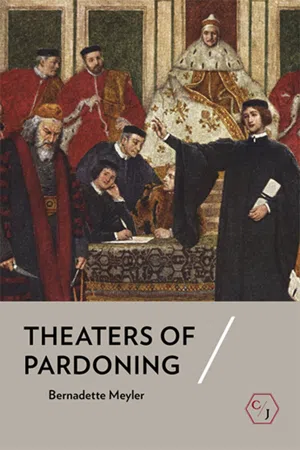
- 324 pages
- English
- ePUB (mobile friendly)
- Available on iOS & Android
Corpus Juris: The Humanities in Politics and Law
About This Book
From Gerald Ford's preemptive pardon of Richard Nixon and Donald Trump's claims that as president he could pardon himself to the posthumous royal pardon of Alan Turing, the power of the pardon has a powerful hold on the political and cultural imagination. In Theaters of Pardoning, Bernadette Meyler traces the roots of contemporary understandings of pardoning to tragicomic "theaters of pardoning" in the drama and politics of seventeenth-century England. Shifts in how pardoning was represented on the stage and discussed in political tracts and in Parliament reflected the transition from a more monarchical and judgment-focused form of the concept to an increasingly parliamentary and legislative vision of sovereignty.
Meyler shows that on the English stage, individual pardons of revenge subtly transformed into more sweeping pardons of revolution, from Shakespeare's Measure for Measure, where a series of final pardons interrupts what might otherwise have been a cycle of revenge, to later works like John Ford's The Laws of Candy and Philip Massinger's The Bondman, in which the exercise of mercy prevents the overturn of the state itself. In the political arena, the pardon as a right of kingship evolved into a legal concept, culminating in the idea of a general amnesty, the "Act of Oblivion, " for actions taken during the English Civil War. Reconceiving pardoning as law-giving effectively displaced sovereignty from king to legislature, a shift that continues to attract suspicion about the exercise of pardoning. Only by breaking the connection between pardoning and sovereignty that was cemented in seventeenth-century England, Meyler concludes, can we reinvigorate the pardon as a democratic practice.
Frequently asked questions
Information
Index
Table of contents
- Acknowledgments
- Introduction: Theaters of Pardoning
- One Dramatic Judgments: Measure for Measure, Revenge, and the Institution of the Law
- Two Emplotting Politics: James I and the “Powder Treason”
- Three Non-Sovereign Forgiveness: Mercy among Equals in The Laws of Candy
- Four From Sovereignty to the State: The Tragicomic Clemency of Massinger’s The Bondman
- Five Between Royal Pardons and Acts of Oblivion: The Transitional Justice of Cosmo Manuche and James Compton, Earl of Northampton
- Six Pardoning Revolution: The 1660 Act of Oblivion and Hobbes’s Recentering of Sovereignty
- Postlude: Pardoning and Liberal Constitutionalism
- Appendix A
- Appendix B
- Bibliography
- Index